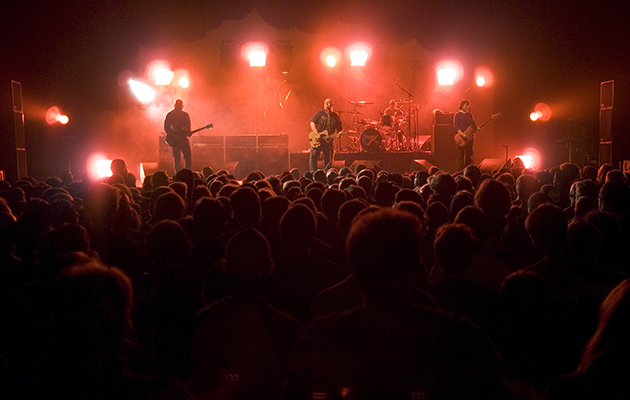June 2004. Maybe it was all a bad dream. The Pixies are on stage at Brixton Academy. Black Francis is screaming out “Monkey Gone To Heaven”, the crowd are screaming back “God is seven!” and in the streets outside the touts have been in ecstasy for a full day, as fans begged to get inside. The band entered to the most full-throated, sustained roar this writer has ever heard: a moment of mass catharsis and relief that makes the crowd collectively shiver.
They look good. Black Francis now has the bald head and black fatigues of Brando’s Colonel Kurtz. Deal and Joey Santiago flank him, impassive and barely altered, while whiskery David Lovering has kindly taken time off from his day-job as a magic act to return behind the drums.
They start quietly, in the byways of their back-catalogue, deliberately anti-climactic. Only when Francis milks the suddenly pertinent lyric in “Here Come Your Man”, “He’s been away so long!”, do the last 12 years come flooding back.
They’ve been difficult for everyone. Santiago entered a period of depression after they split, before forming a band with his wife, The Martinis. Lovering worked as a magician, and suffered a brutal marriage break-up. Deal had a massive hit, “Cannonball”, with The Breeders in 1993, but saw her life falter afterwards. “She started doing the brown, and got flakier and flakier,” recalls Wallace.
Thompson, too, had to face failure. Soundchecking in a small Californian town one afternoon in the early ’90s, a waitress screamed at him to keep it down. Customers were trying to eat. “It felt really good in a way,” he says now. “I felt like I was a real musician, finally. I wasn’t just riding some wave of hype in London. I’m in some shit town, playing in a shit gig, and there’s people eating fish and chips, and a waitress is yelling at me because I’m making too much noise. I felt like I’d really earned something. It felt good to get kicked in the gut. That’s right, I’m not a big fucking deal any more. I’m nobody now.”
Thompson slowly reinvented himself over nine Frank Black albums, becoming an increasingly personal roots-rock songwriter, leaving the Pixies’ once-shocking sound behind, even mothballing his scream. But the past kept struggling to surface.
“I made sure Breeders and Frank Black tours were kept apart,” says Craft, who booked both. “It was an unwritten understanding that their career paths must never cross again. Me and his manager could never say ‘Pixies’ around him, we called it ‘the P-word’. He never talked about it. I think he didn’t think the Pixies were that good. He was disappointed with a lot of it. He felt it could have been better.”
Thompson went to extreme lengths to keep the old days at bay. “Once Kim asked to see Frank Black,” Wallace recalls, “and Charles went through the guestlist and scribbled her name off. It was such a pathetic thing to do. The girl just wanted to see him play because she thinks he’s the greatest songwriter alive. It was so nasty.”
Then, in 2000, Thompson started playing Pixies songs again. A recent divorce and therapy sessions had broken old barriers. “His personal life has changed dramatically,” Craft agrees. “You start to re-evaluate.”
Deal, too, had sorted out her drug problems, and in August 2000 the calls were made. Typically, they dealt with the old eruptions by not dealing with them. “There was some apologising, some hugs. No-one made a big deal out of it,” Thompson recalls. “If they had dragged up the past, they may have realised they couldn’t work together,” says Craft. “They just had to forget it.”
The gigs helped them do that. In America, especially, young crowds barely born when they split treated them like legendary beasts. “It’s not like it was in the beginning,” Thompson agrees, “when people were going completely mental and freaking out in drunken mayhem. That was our moment in time. Nowadays, people just stand there watching. It’s definitely quieter, almost respectful. It’s, ‘Oh, it’s the almighty Pixies. They’re doing their performance now…'”
All the comeback lacks, of course, is a new record. “We’re so enjoying the donations to our bank accounts right now that it almost seems unholy to think about being creative,” Thompson counters. “It seems like it would be tainted by all of our money-making. It’d be cooler to go and make a record later, when we’re not being offered a chunk of dough.”
What Thompson finds more interesting is something he had almost forgotten: the invisible bond he has with his fellow Pixies, the story beneath their story.
“There’s an unspoken dynamic with the band that we’re barely aware of, at the edge of our minds,” he considers. “I notice it when we’re in a room together, there’s this little impenetrable bond. Documentary filmmakers hang out with us, and expect to see really fascinating backstage dramas. And there is something going on, but it’s too subtle for them to see. I could totally feel it when we got back together. Oh, yeah. These people. They even cause me to sing a certain way. I’m very happy to be with them again. I forgot how much I liked this.”
Uncut: the spiritual home of great rock music.


